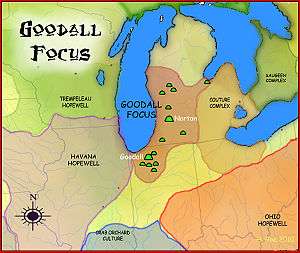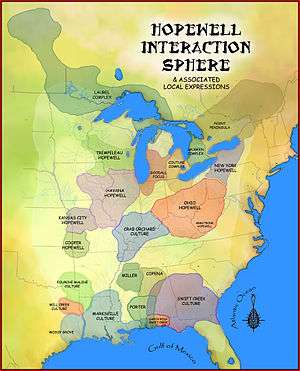Goodall Focus
The Goodall Focus was a Hopewellian culture from the Middle Woodland period peoples that occupied Western Michigan and northern Indiana from around 200 BCE to 500 CE. Extensive trade networks existed at this time, particularly among the many local cultural expressions of the Hopewell communities. The Goodall pattern stretched from the southern tip of Lake Michigan, east across northern Indiana, to the Ohio border, then northward, covering central Michigan, almost reaching to Saginaw Bay on the east and Grand Traverse Bay to the north. The culture is named for the Goodall Site in northwest Indiana.[1]

Ceramics
Ceramics tend to come from middens and contain expanding and contracting stemmed projectile points and obsidian flakes. Research has been on-going through the 1990s at sites in northwest Indiana, the Galien River Basin, the Kalamazoo River Basin and the Grand River basin.[1]
References
- Hopewell Archeology: The Newsletter of Hopewell Archeology in the Ohio River Valley; 4. Current Research on the Goodall Focus; Volume 2, Number 1, October 1996
Further reading
- The Goodall focus: an analysis of ten Hopewellian components in Michigan and Indiana / Ohio; by George I Quimby, Jr.; Indianapolis : Indiana Historical Society, 1941.
- Hopewell Archeology: The Newsletter of Hopewell Archeology in the Ohio River Valley; 4. Current Research on the Goodall Focus; Volume 2, Number 1, October 1996
External links
- The Goodall Tradition Project:Northwestern Indiana Hopewell
- The Newsletter of Hopewell Archeology in the Ohio River Valley
- The Newsletter of Hopewell Archeology in the Ohio River Valley
- Key Indiana Hopewell Site Preserved

